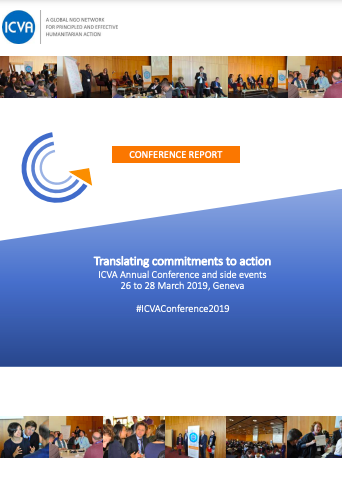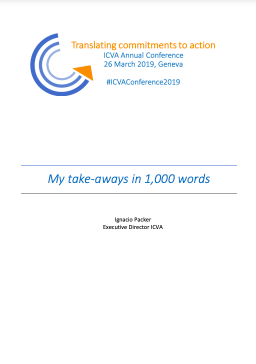-
Search -
Accessibility -
Members Login
Translating commitments to action
Conference, Meeting
English
ICVA
World Humanitarian Summit
Global compact on refugees
ICVA’s 2019 Annual Conference discussed the various commitments made through the World Humanitarian Summit, the Grand Bargain, the New York Declarations and the Global Compacts on Refugees and Migration, the UN Reform process, the Localization discussion- and took a hard look at how and what we, as an NGO community, were doing to translate these commitments into action while putting people at the centre.
The current environment in which NGOs and other humanitarian actors operate is fundamentally changing. In many parts of the world where humanitarians are working, respect for humanitarian principles is eroding and so too is the NGOs space to operate. The pressure for humanitarians to align with development and peace priorities are mounting. How many commitments have been made through the World Humanitarian Summit in 2016, through the Grand Bargain, the Localization discussions, the New York Declaration and the UN reform processes, among others? As NGOs compete for scarce resources, schisms in the community have intensified, particularly related to the localization discussion.
These trends require safe spaces for diverse NGOs to come together to discuss their differences, learn from one another, share solutions and help one another. Now it’s time to take a hard look at how and what we, as an NGO community, should be doing to translate these commitments into action while putting people at the centre.
The conference aims to provide participants:
The conference’s outcome document will capture key learning from the event and look at opportunities for future collaboration, including incorporating outcomes into a learning stream in 2019.


Take-aways from the 2019 Annual Conference in 1000 words by ICVA Executive Director, Ignacio Packer.
A setting the stage of changes in the humanitarian sector and how NGOs need to adapt
Speakers:
Moderator:
A conversation on how some of the positive outcomes of the Grand Bargain initiative can be taken forward through the lens of localisation
Speakers
Reflections from the Grand Bargain Workstream: Government of Switzerland and the International Federation of Red Cross and Red Crescent Societies (IFRC)
Co-Moderators:
A dynamic session sharing experiences of change and how organisations and initiatives are translating commitments to action (Round robin session)
The language lesson: what we’ve learned about communication and community engagement in the Rohingya refugee response | Ms. Mia Marzotto,Senior Advocacy Officer, Translators Without Borders (TWB)
How can Civil Society Organisations Leverage More and Better Resources? | Ms.Yessenia Soto, Community Engagement Officer on Civil Society Resourcing,CIVICUS
DAC Recommendation on the Humanitarian-Development-Peace Nexus| Mr. Hugh Macelman, Policy Advisor & Head of the International Network on Conflict and Fragility (INCAF) Secretariat, Development Cooperation Division, OECD
How can civil society engage in the Global Refugee Forum? | Ms. Perveen Ali & Ms. Sweta Madhuri Kannan, UNHCR
IASC Reform: How can NGOs engage in the new IASC structures? | Ms. Mervat Shelbaya, Chief of the Inter-Agency Standing Committee (IASC) Secretariat
The new Sphere Handbook: from humanitarian principles to humanitarian practice | Ms. Christine Knudsen, Executive Director, Sphere
Strengthening collective responses to Gender-based violence in crises: IOM’s GBViC Framework | Ms. Monica Noriega, Gender-Based Violence (GBV) Specialist in the Department of Operations and Emergencies with the International Organization for Migration (IOM)
An overview of “Islamic Social Financing (ISF)” and its future for the humanitarian sector | Mr. Said Alhudzari, General Manager of Program Operations, MERCY Malaysia
Grand Bargain Transparency core commitment: promoting and enabling the use of IATI humanitarian data | Mr. Angus Urquhart, Senior Policy and Engagement Advisor, Development Initiatives (DI)
The Grand Bargain and Harmonised Reporting: Putting Less Paper More Aid into practice | Mr. Jeremy Rempel, Senior Policy Officer for Humanitarian Finance and Coordinator Less Paper More Aid, ICVA
What protection for children and youth fleeing violence in the Northern Triangle? | Ms. Claudia Janet Valverde, Member of Board of Directors, FM4 Paso Libre